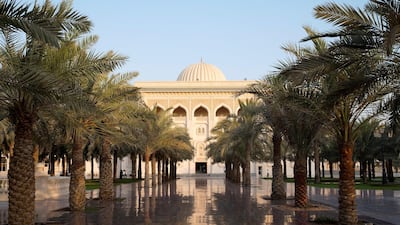When American University of Sharjah opened on October 4, 1997, the campus was surrounded by nothing but desert.
Founded by Dr Sheikh Sultan bin Mohammed Al Qasimi, Ruler of Sharjah, construction works for the new university were finished in just 11 months.
A grainy black and white photograph from the 1990s shows the scale of the endeavour, with the main auditorium and surrounding buildings edging to completion against this isolated backdrop.
On that historic day in 1997, just 285 students arrived for their first classes and were taught by 30 faculty members.
Twenty years on, the AUS campus has become a modern complex of buildings including a performing arts theatre. It now caters for more than 5,800 students and 370 staff.
Among those 30 pioneering faculty members was Osamah AlKhazali. A professor of finance at AUS, he arrived from the US where he had received his doctorate.
“To be honest, I thought ‘oh my gosh what did I do’,” he says of the decision to come from the US to Sharjah in 1997.
“I had a good job in the US and then I moved to the middle of the desert. It was an unusual experience because the school was not completed. We had to start from the beginning. But I made the right decision.”
______________
Read more:
Scholarships in GCC’s first masters degree in biomedical engineering
Khalifa University scores UAE's best ranking ever by Times Higher Education
______________
Prof AlKhazali, who is originally from Jordan, recalls a time when the closest supermarket was ten kilometres away and students, staff and faculty used a daily bus service to get there and back.
“Around 6pm the bus took us. We did our shopping and came back. It was called Fine Fair but it’s not there anymore. There were roads on campus but the roads to get on campus were not completed.”
Over those first few days and months, a pioneering spirit swiftly developed across the campus. It was a tight-knit community and a feeling of being among family was widespread.
“The faculty came from all over the world. They did not know each other and all of us were in one building,” said Prof AlKhazali.
“But despite that, we all felt like a family. The relationship among the faculty and students was amazing. These are the things that I miss and remember the most because the school is so much bigger now.”
AUS offers an American-accredited education and was recently named among the world’s top 60 institutions under 50 years old by Quacquarelli Symonds. It was ranked in the 601 to 800 band of universities worldwide and at number 14 in the “Best universities in the Arab World 2017” by the Times Higher Education ranking survey.
The student body is multi-cultural. About 17 per cent are Emirati with the rest coming from Egypt, Jordan, India, Syria, Pakistan, Palestine and more from across the GCC and world. It has 25 sports teams, 86 student clubs, while 440 students have participated in community service programmes.
On Wednesday, AUS marked the start of its 20th anniversary celebrations with a special event at its campus including a commemorative film; an address from prominent past pupil Aisha Miran, now assistant Secretary General for the Executive Council, Dubai government; and a parade of nations from its diverse student body.
When I ask the chancellor of AUS, Dr Björn Kjerfve, about the role the university has played since its establishment in 1997, he says AUS has supported Sharjah in its growth to become the capital in the Arab world in terms of culture and education.
“The world has changed enormously since 1997 – any such country without a university would have been left behind in the dust,” he said.
“If you didn’t have a university, you’d have a difficult time becoming a centre of culture. That’s not the case here, we have a university.”
When asked about AUS’s relationship with the emirate, he says it’s excellent but it can get better. Dr Kjerfve, who is originally from Sweden, regularly goes on trips with economic delegations from Sharjah to promote the emirate and education is central to that. “With the leadership we have in Sharjah, we are all looking at how we can hook onto each other.”
An oceanographer by trade, Dr Kjerfve’s tenure began in 2014 and plans to transform AUS into a research university are under way. He believes AUS is the best university in the country.
“Best can be measured in many different ways. I hold that if you ask hundreds of companies around the GCC which university graduates the best employees – the answer would uniformly be AUS. We only consider merit in all the decisions we make.
“We are a teaching centric, excellent university and are now going to become a research university on top of that. That’s going to be a remarkable transformation – certainly a first for the GCC and one of the few places in the Arab world where that is happening.”
AUS is planning a series of events throughout the remainder of the year to commemorate its anniversary and to honour the accomplishments of staff, faculty, students and alumni.


